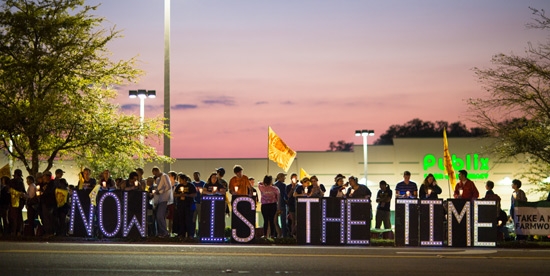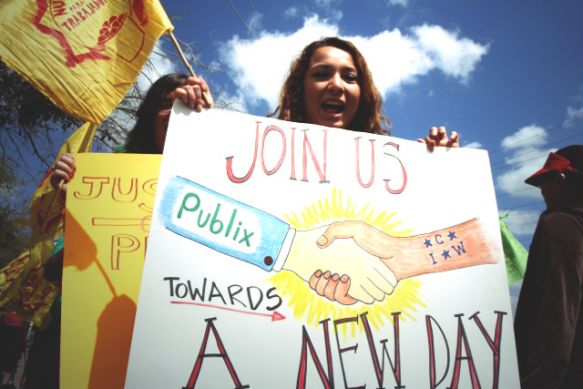[hupso_hide][hupso title=”#NowIsTheTime Tour, #FairFoodProgram catch attention of @TheNation and @TakePart” url=”https://ciw-online.org/?=18968″]
Answers to that question and more, with all the latest press from the Fair Food front!
Even as we gear up for what is sure to be an exciting April — the month ahead is already overflowing with events, including the recently-announced screening of “Food Chains” at Tribeca, the CIW’s visit to Amsterdam to participate in Ahold’s annual shareholder meeting (last year’s visit provided us with this memorable reflection), and a trip to the University of California at Berkeley to take part in Michael Pollan’s popular lecture series there, among many other things — we don’t want to ignore the press that continues to roll out this month in the wake of the Now is the Time Tour! So here below are three of the best articles from the most recent coverage of the CIW’s ongoing Campaign as well as the groundbreaking Fair Food Program.
First up, hot off the presses, the Nation published a quick-hitting story on the CIW yesterday following up on the 10-day, 10-city Tour that hit both Columbus and Lakeland. This piece is short and sweet, so we thought we’d share it in full:
Why Are Students Protesting Wendy’s and Publix?
The indefatigable Coalition of Immokalee Workers recently wrapped up its “Now is the Time” Tour—a ten-day, ten-city tour designed to pressure Wendy’s and Publix supermarkets—two of the remaining hold-out retailers–to embrace the highest standard of farm labor protections and increased pay in US agriculture, the Fair Food Program.
Wendy’s now stands alone as the only major fast-food brand that has refused to join the FFP, a unique farmworker-driven initiative consisting of a wage increase supported by a price premium paid by corporate purchasers of Florida tomatoes, and a human-rights-based Code of Conduct, applicable throughout the Florida tomato industry.
More than 800 consumers marched on Wendy’s headquarters in Columbus, OH, and over 1,000 faith, student and community supporters joined farmworkers on March 14 for a 24-hour vigil and march in Publix’s hometown of Lakeland, FL.
Another big step in the direction of equity and justice is National Farmworker Awareness Week. Five days of action for students and community members to raise awareness about farmworker issues, the annual event is currently marking its 15th anniversary in 2014. Honor the occasion by learning how you can help advance the cause of farmworker justice and equity by calling Wendy’s management, delivering info to Wendy’s franchises, educating your community about the issues and helping spread the word about the campaign.
Next up, Take Part, the popular online hub for social action, also recently took notice of the CIW’s ongoing efforts to transform the Florida agricultural industry. Food writer Steve Holt takes a hard look at Publix’s excuses for turning its back on farmworker rights — excuses the CIW’s Oscar Otzoy calls ever more “tired and deflated” — in light of Walmart’s decision to join the Fair Food Program this past January. Below is an extended excerpt:
Why Won’t Some Supermarket Chains Pay 1 cent per Pound to Tomato Pickers?
In January, the world’s biggest company entered into a landmark collaboration with Florida tomato farmworkers to increase their wages and safeguard their rights. Many thought a tidal wave of restaurants and grocers would follow Walmart, as the company had already influenced American retail in so many other ways.
Not necessarily. Walmart had joined Whole Foods and Trader Joe’s as major grocery chains to sign the Coalition of Immokalee Workers’ Fair Food Program, in which retailers agree to pay a penny more per pound for Florida tomatoes to increase workers’ wages, and refuse to do business with growers who exploit their workers. Yet several major supermarket chains—including Publix, Kroger, and Ahold USA (which owns Stop & Shop and Giant supermarkets)—remain holdouts.
The CIW has petitioned Publix, which is headquartered in its Central Florida backyard, especially hard to join the program. Last week, farmworkers and activists completed a 10-day, 10-city advocacy tour that began in Columbus, Ohio—home of Wendy’s, the last major fast-food holdout—and ended with a 24-hour vigil in Publix’s hometown, Lakeland, Fla.
“Wendy’s and Publix cannot continue to reject the Fair Food Program after it has been accepted and implemented by 12 other corporations around the country and been proven to be a success in the lives of workers,” says Oscar Otzoy, farmworker and CIW member. “It was powerful for us to see how many people understood why we took 10 days off from work and sacrificed that pay to take the time to make the call to those corporations even stronger.” […]
[…] “Over the last many years, Publix has continued to use the same tired and deflated arguments as their refusal to join the Fair Food Program,” says Otzoy, who emigrated to the United States from Guatemala. “At this point the arguments are absolutely and completely absurd. We are seeing a transformed industry [coalition] that is made up of workers, 90 percent of Florida growers, and 12 major retailers. And, of course, the penny is in the price.”
“And they know that,” he adds. “They are aware that the way they are describing the process is not accurate.”
The refusal of Wendy’s to join its fast-food compatriots in safeguarding farmworkers is also puzzling. Before joining the burger chain as chief executive, Emil Brolick ran Taco Bell, the target of CIW’s nationwide boycott between 2001 and 2005, during which 25 colleges and universities booted the chain off campus. Brolick was at the helm when Taco Bell became the Fair Food Program’s first signatory in 2005… read more
And finally, the Fair Food Program’s unique worker-to-worker education and enforcement mechanisms received some well-earned praise from the Institute for Southern Studies, with a particular focus on the issue of sexual harassment. 80% of farmworker women nationally report having suffered sexual harassment on the job, but that is changing — really changing — today in the Florida tomato industry, thanks to market consequences for human rights violations built into the Fair Food Program:
Sexual harassment still ‘normal’ in low-wage jobs
The Fair Food Code of Conduct CIW negotiated with Florida tomato growers and fast food chains enables CIW to set up worker-to-worker trainings that address sexual harassment on company time. A Know Your Rights booklet and video include a sexual harassment scenario scripted and acted by CIW members.
The Code has enforcement provisions, too. Sexual harassment that involves physical contact will cause curtailment of tomato purchases from participating growers for at least three months, unless the harasser is fired and other corrective action is taken. read more
And that’s a wrap for March press! Stay tuned for more on all of the action coming up in April…



